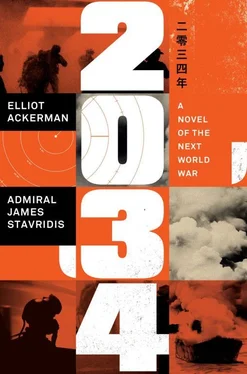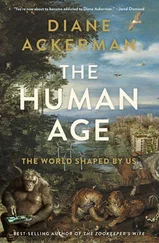Isfahan
At the Second Army’s administrative center nobody knew for certain what had happened in the South China Sea. The General Staff of the Armed Forces had issued a nationwide mobilization order; the country was going to war, or was at least on the brink of war, yet no one could say exactly why. When leaving his family’s home, Farshad thought of wearing his uniform but decided against it. He was no longer a brigadier in the Revolutionary Guards, let alone a brigadier in the elite Quds Force. He was a civilian now, and even though it had only been a few weeks the break felt permanent—less a break, more an amputation. Whether this amputation was reversible Farshad would soon discover. He was waiting in a line that extended down a corridor on the third floor of this vast administrative annex. He was, he guessed, the oldest person in the line by several decades. He could feel the others stealing glances at this man with all the scars and three fingers on his right hand.
After less than an hour, he was escorted out of the line and up a set of stairs to an office on the fourth floor. “Now wait here,” said a corporal, who spoke to Farshad as though he outranked him. The corporal stepped into the office only to emerge moments later and wave Farshad in.
It was a spacious corner office. Behind the large oak desk were a pair of crossed flags; the first was the flag of the Islamic Republic and the second that of the army. A uniformed man, a colonel in the administrative service, approached Farshad with his hand outstretched. His palm was smooth and his uniform had been starched and ironed so many times that it shined with a metallic patina. The colonel asked for the old brigadier, the hero of the Golan Heights, the recipient of the Order of the Fath, to sit and join him for tea. The corporal set the glasses out, first in front of Farshad and then in front of the colonel.
“It is an honor to have you here,” said the colonel between sips of tea.
Farshad shrugged. An obsequious exchange wasn’t the point of his visit. Not wanting to appear impolite, he muttered, “You have a nice office.”
“I’m sure you’ve enjoyed nicer.”
“I was a field commander,” Farshad answered, shaking his head. “I can’t remember ever really having an office.” Then he took another sip of tea, finishing his glass in a single gulp and placing it loudly on the tray, as if to indicate that the pleasantries were over and Farshad wanted to get down to business.
From a drawer, the colonel removed a manila envelope and slid it across the desk. “This arrived late last night from Tehran via courier. I was told if you appeared here to hand it to you personally….” Farshad opened the envelope: it contained a single document printed on thick stock, riddled with calligraphy, seals, and signatures.
“It is a commission as a lieutenant commander in the Navy?”
“I was instructed to convey that Major General Bagheri, the chief of the General Staff of the Armed Forces, has, himself, asked that you consider accepting this commission.”
“I was a brigadier before,” said Farshad as he dropped the letter of commission on the colonel’s desk.
To this, the colonel had no response.
“Why are we mobilizing?” asked Farshad.
“I don’t know,” replied the colonel. “Like you, I don’t have a full explanation, only my orders at this point.” Then he took another envelope from his desk and handed it to Farshad. It contained a travel itinerary for a flight to Damascus with a transfer to Russia’s naval base in the Syrian port city of Tartus, where he was to report for “liaison duties.” Farshad couldn’t tell if the assignment was legitimate or designed as an insult. That confusion must have shown in his expression: the colonel began to explain how from “an administrative standpoint” it would be very difficult to reappoint a reprimanded officer to a commensurate rank within the same branch of the armed forces. “I happen to know,” the colonel continued, “that the senior ranks of the Revolutionary Guards are oversubscribed. Your service to the Islamic Republic is needed; this is the only vacancy that can be afforded to you.” The colonel reached into his drawer again and removed a pair of shoulder boards embroidered with the gold piping of a navy lieutenant commander. He placed them on the desk between himself and Farshad.
Farshad stared contemptuously at the rank, which was a demotion for him three times over. Had it come to this? If he wanted a role in the impending conflict, would he have to prostrate himself in this way, and not even for a frontline assignment, but for some auxiliary job as a liaison with the Russians? And to be a sailor? He didn’t even like boats. Soleimani had never had to suffer such an indignity, nor had his father. Farshad stood and faced the colonel, his jaw set, his hands balled into fists. He didn’t know what he should do, but he did know what his father and Soleimani would have told him to do.
Farshad gestured for the colonel to hand him a pen, so that he could sign the acceptance of his commission. Then he gathered up his orders and his itinerary to Tartus and turned to leave. “Lieutenant Commander,” the colonel said as Farshad headed toward the door. “Forgetting something?” He held up the shoulder boards. Farshad took them and again made for the door.
“Aren’t you forgetting something else, Lieutenant Commander?”
Farshad looked back blankly.
Then he realized. He struggled to control a familiar rage from deep in his stomach, one that on other occasions had spurred him to violence. This fool in his over-starched uniform, with his corner office that he never left. This fool who’d no doubt gone from cushy assignment to cushy assignment, all the while posing as though he were a real soldier, as though he knew what fighting and killing were. Farshad wanted to choke him, to squeeze him by the neck until his lips turned blue and his head hung limply by the stump of his neck.
But he didn’t. He buried that desire in a place where he could later retrieve it. Instead he stood up straight, at attention. With his three-fingered right hand, Lieutenant Commander Qassem Farshad saluted the administrative colonel.

07:26 May 06, 2034 (GMT+8)
Southeast of the Spratly Islands
Lin Bao could see early light on the water. It had been so long since he had been at sea. So long since he had held command.
Not so long, however, since their great victory in these waters, or since his government had released to the world news of its victory over the Americans—thirty-seven ships sunk from the Seventh Fleet, to include the carriers Ford and Miller —and that same stunned world had woken to a new reality—the balance of power on the ocean had shifted. And not so long since he had received his orders from Minister Chiang himself to take command of the Zheng He Carrier Battle Group. He had left his wife and daughter in Beijing three days before and arrived at the South Sea Fleet Headquarters at Zhanjiang with his orders in hand.
Lin Bao was thinking of Ma Qiang as he flew out to meet what was now his ship. The two young pilots of his twin-rotor transport had invited him to sit in the cockpit’s third jump seat. They were cheerful and proud of their assignment to deliver their new commander from Zhanjiang to his carrier, assuring him of a smooth flight and a perfect landing, “…which is good luck for a new commander,” one of them said with a toothy grin as they finished their preflight. Observing the sea from the cockpit, Lin Bao wondered if Ma Qiang’s body was somewhere beneath him. His old classmate’s dying wish having been a burial at sea. This, Lin Bao knew, was all part of a legend that Ma Qiang had orchestrated throughout his life, up to his death, which conveniently had arrived at the moment of his greatest victory. Like the naval hero Admiral Horatio Nelson at Trafalgar, Ma Qiang had maneuvered his flagship recklessly close to the action, inviting the peril that would assure his glory. When one American aircraft, an old model F/A-18 Hornet, slipped the Zheng He ’s defenses, the pilot did something distinctly un-American. The pilot had kamikazed into the Zheng He ’s flight deck, right beneath the bridge.
Читать дальше













